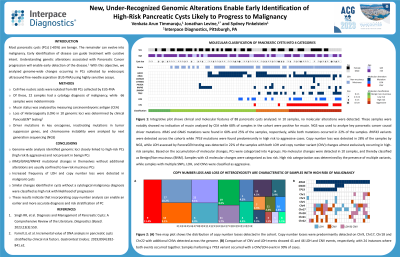Tuesday Poster Session
Category: Biliary/Pancreas
P2882 - New, Under-Recognized Genomic Alterations Enable Early Identification of High-Risk Pancreatic Cysts Likely to Progress to Malignancy
Tuesday, October 24, 2023
10:30 AM - 4:00 PM PT
Location: Exhibit Hall

Has Audio
- JL
Jonathan Levine, MBA, PhD
Interpace Diagnostics
Pittsburg, PA
Presenting Author(s)
Venkata Arun Timmaraju, MS, Sydney Finkelstein, MD, Jonathan Levine, MBA, PhD
Interpace Diagnostics, Pittsburgh, PA
Introduction: Most pancreatic cysts (PCs) ( >85%) are benign; the remainder are capable of evolving into malignancy. Early detection of PC disease progression enables treatment with curative intent. A full scope and understanding of the associated genetic alterations linked to Pancreatic Cancer progression will increase early detection of the disease. With this objective, we utilized a highly sensitive assay to search for genome wide aberrations to discover new/under-recognized genomic loci associated with high-risk PCs.
Methods: PCs (n=88) classified as benign/non-mucinous (BNM, n=10), benign/mucinous (BM, n=39), high grade dysplasia/focal adenocarcinoma (HG, n=15), and invasive adenocarcinoma (INV, n=24) were tested for mucinous state via Carcinoembryonic Antigen (CEA) and/or Glucose by fluid chemistry. KRAS, GNAS, and RNF43 (KGR) variants relationship to the mucinous state and genome wide chromosomal instability (CI) were analyzed by next generation sequencing (NGS).
Results: The presence, distribution and extent of accumulated alterations varied between the PC groups. BNM cysts showed no alterations. While KGR mutations were frequent in BM cysts (28/39, 71.8%), CIs were infrequent (5/39, 12.8%) and limited to 1 per PC when present. In contrast, HG cysts displayed both frequent KGR mutations (13/14, 92.9%) and notably high CI (15/15, 100%) with no fewer than two alterations per PC. Changes in INV mirrored those noticed in the HG cohort. New/under-recognized genomic loci of LOH were frequently identified at 1q, 3p, 6q, 7p, 9p, 9q, 10q, 14q, 16q, 19q, and 22q as well as other loci in lower frequencies.
Discussion: Genome-wide analysis identified genomic loci closely linked to high-risk PCs (HG & INV) and not present in benign PCs. KRAS/GNAS/RNF43 mutational changes in themselves without additional alterations are usually confined to low-risk mucinous PCs. However, the clinical utility of high variant allele frequency KGR variants are not fully cognized. High-risk alterations detected in our study are genomic loci that are new or under-recognized. These alterations involve different molecular pathways for neoplastic progression. Our findings enable more comprehensive and specific discrimination of PCs risk stratification. Incorporating CI analysis enables an earlier and more accurate diagnosis of PCs.
Disclosures:
Venkata Arun Timmaraju, MS, Sydney Finkelstein, MD, Jonathan Levine, MBA, PhD. P2882 - New, Under-Recognized Genomic Alterations Enable Early Identification of High-Risk Pancreatic Cysts Likely to Progress to Malignancy, ACG 2023 Annual Scientific Meeting Abstracts. Vancouver, BC, Canada: American College of Gastroenterology.
Interpace Diagnostics, Pittsburgh, PA
Introduction: Most pancreatic cysts (PCs) ( >85%) are benign; the remainder are capable of evolving into malignancy. Early detection of PC disease progression enables treatment with curative intent. A full scope and understanding of the associated genetic alterations linked to Pancreatic Cancer progression will increase early detection of the disease. With this objective, we utilized a highly sensitive assay to search for genome wide aberrations to discover new/under-recognized genomic loci associated with high-risk PCs.
Methods: PCs (n=88) classified as benign/non-mucinous (BNM, n=10), benign/mucinous (BM, n=39), high grade dysplasia/focal adenocarcinoma (HG, n=15), and invasive adenocarcinoma (INV, n=24) were tested for mucinous state via Carcinoembryonic Antigen (CEA) and/or Glucose by fluid chemistry. KRAS, GNAS, and RNF43 (KGR) variants relationship to the mucinous state and genome wide chromosomal instability (CI) were analyzed by next generation sequencing (NGS).
Results: The presence, distribution and extent of accumulated alterations varied between the PC groups. BNM cysts showed no alterations. While KGR mutations were frequent in BM cysts (28/39, 71.8%), CIs were infrequent (5/39, 12.8%) and limited to 1 per PC when present. In contrast, HG cysts displayed both frequent KGR mutations (13/14, 92.9%) and notably high CI (15/15, 100%) with no fewer than two alterations per PC. Changes in INV mirrored those noticed in the HG cohort. New/under-recognized genomic loci of LOH were frequently identified at 1q, 3p, 6q, 7p, 9p, 9q, 10q, 14q, 16q, 19q, and 22q as well as other loci in lower frequencies.
Discussion: Genome-wide analysis identified genomic loci closely linked to high-risk PCs (HG & INV) and not present in benign PCs. KRAS/GNAS/RNF43 mutational changes in themselves without additional alterations are usually confined to low-risk mucinous PCs. However, the clinical utility of high variant allele frequency KGR variants are not fully cognized. High-risk alterations detected in our study are genomic loci that are new or under-recognized. These alterations involve different molecular pathways for neoplastic progression. Our findings enable more comprehensive and specific discrimination of PCs risk stratification. Incorporating CI analysis enables an earlier and more accurate diagnosis of PCs.
Disclosures:
Venkata Arun Timmaraju: Interpace Diagnostics – Employee.
Sydney Finkelstein: Interpace Diagnostics – Employee.
Jonathan Levine: Interpace Diagnostics – Employee.
Venkata Arun Timmaraju, MS, Sydney Finkelstein, MD, Jonathan Levine, MBA, PhD. P2882 - New, Under-Recognized Genomic Alterations Enable Early Identification of High-Risk Pancreatic Cysts Likely to Progress to Malignancy, ACG 2023 Annual Scientific Meeting Abstracts. Vancouver, BC, Canada: American College of Gastroenterology.
